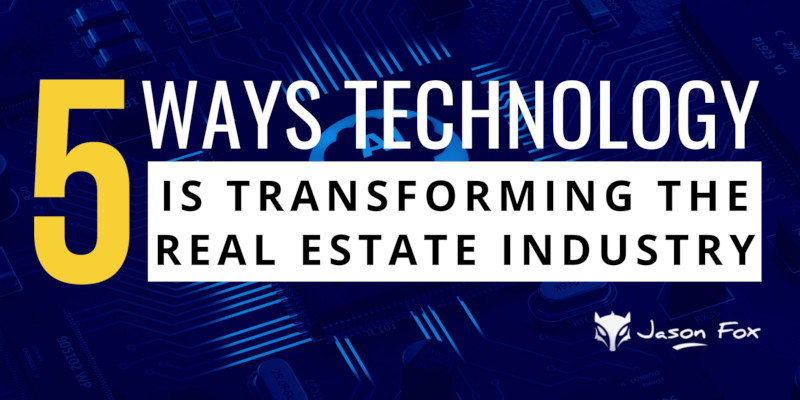5 Ways Technology is Transforming the Real Estate Industry
Technological developments are constantly changing the way we work and live, and real estate is no exception. The real estate industry is one of those sectors that have always depended on technological advancements. However, the past decade has held some major breakthroughs.
Whether you are a prospective homeowner looking to buy your first ever house, a landlord looking to get better tenants, a property manager trying to make your job easier, or a real estate agent looking to sell more properties, you need to pay close attention to the emerging tech trends in the real estate industry.
Here are a few ways the technologies of today are transforming the sector.
Online Real Estate Marketplaces
According to the National Association of Realtors, 52% of buyers found the home they purchased on the internet. Online real estate marketplaces of today offer great functionality and approachability. As most people prefer to check out a property online before visiting, the convenience of online marketplaces allows realtors to get more exposure for their listings.
Online real estate marketplaces make selling and buying properties easier and more intuitive. They allow users to search for properties based on parameters such as pricing, location, number of rooms, etc. And they are becoming easier to navigate with each passing day.
Online real estate marketplaces significantly speed up the home-buying process. They make it possible for a prospective homebuyer to shortlist properties in a couple of days or even hours. As online real estate marketplaces continue to grow, we can expect better experiences for everyone involved. This will result in more market activity.
Blockchain

The major advantage of blockchain is that it makes it possible for organizations and individuals to process major transactions without the involvement of intermediaries such as governments, banks, and credit card companies.
Banks, lawyers, and brokers have always played a major role in the real estate sector. Thanks to blockchain, real estate platforms can cut out intermediaries, allowing their users to save on fees and commissions. As a result, sellers and buyers can get more out of their money.
One way blockchain allows home sellers and homebuyers to avoid intermediaries is through the introduction of smart contracts to the real estate industry. The transfer of ownership of property is typically a long and complicated process. But smart contracts can make it much simpler.
Smart contracts are essentially self-executing contracts. Their terms are written into lines of codes that exist on a blockchain network. Smart contracts can save time on closing transactions and lower contracting costs.
Tokenization can also turn real estate into a liquid asset as tokens allow people to readily trade real estate.
So far, real estate tech has mostly dealt with connecting sellers and buyers. Blockchain enables online marketplaces and trading platforms to support real estate transactions more comprehensively while maintaining maximum transparency and security.
It offers us a completely new way to trade real estate. For instance, we can use blockchain to split assets into tokens. Blockchain has made fractional ownership of property a reality. Tokenization allows us to trade assets much like stocks.
Landlords can use blockchain and tokenization to sell just a portion of their property. This allows almost anyone who has an internet connection and meets capital requirements to invest in real estate. Moreover, investors can resell their tokens on the open market. Tokenization can also turn real estate into a liquid asset as tokens allow people to readily trade real estate.
Artificial Intelligence (AI)
At the moment, artificial intelligence is likely the most consequential technology in the real estate industry. Artificial intelligence can make fairly accurate predictions of future property value by analyzing vast amounts of old data.
An AI algorithm can dissect tens of thousands of data points to detect patterns in the market. When predicting property value, AI can take into account public information such as marketplace activity, crime rates, local transportation network statistics, etc.
For instance, Skyline AI is developing a platform that can capture arbitrage between asking price and marketing price, identify future market trends, and predict future rent. Their AI software can analyze property information covering the last 50 years and compare as many as 10,000 property attributes.
Marketing and Sales
By analyzing existing market data, AI can help realtors improve lead generation, lead management, content marketing, and personalized messages and promotions. AI can also analyze realtor’s intent and past sales records to recommend them properties to buy and sell.
Realtors can use NLP (natural language processing) algorithms to understand what matters to homebuyers in a certain area and what is unique about a specific property from listings.
Chatbots can offer automated customer service 24/7, this can all be done without the need for a human agent.
Of course, the role of AI in real estate is to help both realtors and homebuyers. AI technologies can also make the property search easier for homebuyers.
Realtors can harness the power of Conversational AI and develop the right chatbot strategy to help clients find the perfect new home. Instead of displaying far more information than buyers need, real estate websites can employ chatbots to find out exactly what buyers want and offer it to them.

Then, the chatbot can recommend them properties that align with their values, personality traits, and preferences. Instead of offering them an overwhelming number of options, the chatbot will offer the buyer a few personalized offerings that perfectly match their preferences.
And, since chatbots can offer automated customer service 24/7, this can all be done without the need for a human agent. Thanks to machine-learning, such chatbots get smarter on their own with each interaction.
Data Management
Not only does AI have the ability to collect, analyze, and learn from data, it can also do wonders for data management. As a real estate company grows, it has to deal with more and more datasets of zoning regulations, ownership history records, tax reports, legal papers, property appraisal reports, and lease abstractions.
Real estate companies can use AI solutions for classifying and storing documents. For example, such an AI solution can even proactively alert the user when a property explodes in popularity or when a new appraisal is due.
The Internet of Things (IoT)
The Internet of Things, also called the Physical Web, refers to a network of internet-enabled devices that can talk to each other. Smart home devices are a subset of IoT. The internet now lives in our locks, light switches, doors, HVAC systems, etc.
IoT devices that can keep track of system irregularities and automate maintenance create a selling advantage
IoT devices can turn every action an occupant of a property makes into a data point. Real estate agents and property managers can use the collected data to improve the experience of homeowners and homebuyers. For instance, property managers can use the collected data to learn:
- Which spaces are used the most?
- What is the foot traffic like inside the property during different times of the day?
- What are the preferences of occupants regarding lighting, heating, etc?
IoT devices allow real estate companies to track various trends and improve the way they manage assets. Of course, they can also feed the gathered data to the aforementioned AI solutions.

The learned usage patterns allow such smart devices to cut down energy usage. So, the ability to significantly reduce utility bills is one of the biggest perks IoT devices can offer property managers.
IoT devices also allow property managers to improve predictive maintenance. It allows them to identify potential system failures and resolve them before they occur. IoT devices that can keep track of system irregularities and automate maintenance create a selling advantage for real estate agents and property owners.
Extended Reality (XR)
Extended reality encapsulates virtual reality (VR), augmented reality (AR), and mixed reality (MR). These days, XR is transforming the way people buy real estate. XR promises to revolutionize the way we do open houses.
Thanks to AR, closing deals for unfurnished properties will become much easier.
Of course, every buyer wants to know what their new home will look like before they buy it. If you are moving to a distant city, this can prove difficult.
VR can allow a buyer to visit a prospective home without actually stepping foot on the property. To view the property inside and out, all they need is a VR headset.

Thanks to AR, closing deals for unfurnished properties will become much easier. Home staging apps such as Stagely, or the one developed by Sotheby’s, make property staging cheaper and much more fun.
AR home staging apps allow realtors to stage a property in seconds, without all the heavy lifting. Of course, buyers can also use AR home staging apps themselves to “fill” their prospective homes with furniture and interior decor that is to their liking. Unlike physical property staging, AR home staging apps allow homebuyers to check out a variety of different looks in a short period of time.
post contents
Technological developments are constantly changing the way we work and live, and real estate is no exception. The real estate industry is one of those sectors that have always depended on technological advancements. However, the past decade has held some major breakthroughs.
Whether you are a prospective homeowner looking to buy your first ever house, a landlord looking to get better tenants, a property manager trying to make your job easier, or a real estate agent looking to sell more properties, you need to pay close attention to the emerging tech trends in the real estate industry.
Here are a few ways the technologies of today are transforming the sector.
Online Real Estate Marketplaces
According to the National Association of Realtors, 52% of buyers found the home they purchased on the internet. Online real estate marketplaces of today offer great functionality and approachability. As most people prefer to check out a property online before visiting, the convenience of online marketplaces allows realtors to get more exposure for their listings.
Online real estate marketplaces make selling and buying properties easier and more intuitive. They allow users to search for properties based on parameters such as pricing, location, number of rooms, etc. And they are becoming easier to navigate with each passing day.
Online real estate marketplaces significantly speed up the home-buying process. They make it possible for a prospective homebuyer to shortlist properties in a couple of days or even hours. As online real estate marketplaces continue to grow, we can expect better experiences for everyone involved. This will result in more market activity.
Blockchain

The major advantage of blockchain is that it makes it possible for organizations and individuals to process major transactions without the involvement of intermediaries such as governments, banks, and credit card companies.
Banks, lawyers, and brokers have always played a major role in the real estate sector. Thanks to blockchain, real estate platforms can cut out intermediaries, allowing their users to save on fees and commissions. As a result, sellers and buyers can get more out of their money.
One way blockchain allows home sellers and homebuyers to avoid intermediaries is through the introduction of smart contracts to the real estate industry. The transfer of ownership of property is typically a long and complicated process. But smart contracts can make it much simpler.
Smart contracts are essentially self-executing contracts. Their terms are written into lines of codes that exist on a blockchain network. Smart contracts can save time on closing transactions and lower contracting costs.
Tokenization can also turn real estate into a liquid asset as tokens allow people to readily trade real estate.
So far, real estate tech has mostly dealt with connecting sellers and buyers. Blockchain enables online marketplaces and trading platforms to support real estate transactions more comprehensively while maintaining maximum transparency and security.
It offers us a completely new way to trade real estate. For instance, we can use blockchain to split assets into tokens. Blockchain has made fractional ownership of property a reality. Tokenization allows us to trade assets much like stocks.
Landlords can use blockchain and tokenization to sell just a portion of their property. This allows almost anyone who has an internet connection and meets capital requirements to invest in real estate. Moreover, investors can resell their tokens on the open market. Tokenization can also turn real estate into a liquid asset as tokens allow people to readily trade real estate.
Artificial Intelligence (AI)
At the moment, artificial intelligence is likely the most consequential technology in the real estate industry. Artificial intelligence can make fairly accurate predictions of future property value by analyzing vast amounts of old data.
An AI algorithm can dissect tens of thousands of data points to detect patterns in the market. When predicting property value, AI can take into account public information such as marketplace activity, crime rates, local transportation network statistics, etc.
For instance, Skyline AI is developing a platform that can capture arbitrage between asking price and marketing price, identify future market trends, and predict future rent. Their AI software can analyze property information covering the last 50 years and compare as many as 10,000 property attributes.
Marketing and Sales
By analyzing existing market data, AI can help realtors improve lead generation, lead management, content marketing, and personalized messages and promotions. AI can also analyze realtor’s intent and past sales records to recommend them properties to buy and sell.
Realtors can use NLP (natural language processing) algorithms to understand what matters to homebuyers in a certain area and what is unique about a specific property from listings.
Chatbots can offer automated customer service 24/7, this can all be done without the need for a human agent.
Of course, the role of AI in real estate is to help both realtors and homebuyers. AI technologies can also make the property search easier for homebuyers.
Realtors can harness the power of Conversational AI and develop the right chatbot strategy to help clients find the perfect new home. Instead of displaying far more information than buyers need, real estate websites can employ chatbots to find out exactly what buyers want and offer it to them.

Then, the chatbot can recommend them properties that align with their values, personality traits, and preferences. Instead of offering them an overwhelming number of options, the chatbot will offer the buyer a few personalized offerings that perfectly match their preferences.
And, since chatbots can offer automated customer service 24/7, this can all be done without the need for a human agent. Thanks to machine-learning, such chatbots get smarter on their own with each interaction.
Data Management
Not only does AI have the ability to collect, analyze, and learn from data, it can also do wonders for data management. As a real estate company grows, it has to deal with more and more datasets of zoning regulations, ownership history records, tax reports, legal papers, property appraisal reports, and lease abstractions.
Real estate companies can use AI solutions for classifying and storing documents. For example, such an AI solution can even proactively alert the user when a property explodes in popularity or when a new appraisal is due.
The Internet of Things (IoT)
The Internet of Things, also called the Physical Web, refers to a network of internet-enabled devices that can talk to each other. Smart home devices are a subset of IoT. The internet now lives in our locks, light switches, doors, HVAC systems, etc.
IoT devices that can keep track of system irregularities and automate maintenance create a selling advantage
IoT devices can turn every action an occupant of a property makes into a data point. Real estate agents and property managers can use the collected data to improve the experience of homeowners and homebuyers. For instance, property managers can use the collected data to learn:
- Which spaces are used the most?
- What is the foot traffic like inside the property during different times of the day?
- What are the preferences of occupants regarding lighting, heating, etc?
IoT devices allow real estate companies to track various trends and improve the way they manage assets. Of course, they can also feed the gathered data to the aforementioned AI solutions.

The learned usage patterns allow such smart devices to cut down energy usage. So, the ability to significantly reduce utility bills is one of the biggest perks IoT devices can offer property managers.
IoT devices also allow property managers to improve predictive maintenance. It allows them to identify potential system failures and resolve them before they occur. IoT devices that can keep track of system irregularities and automate maintenance create a selling advantage for real estate agents and property owners.
Extended Reality (XR)
Extended reality encapsulates virtual reality (VR), augmented reality (AR), and mixed reality (MR). These days, XR is transforming the way people buy real estate. XR promises to revolutionize the way we do open houses.
Thanks to AR, closing deals for unfurnished properties will become much easier.
Of course, every buyer wants to know what their new home will look like before they buy it. If you are moving to a distant city, this can prove difficult.
VR can allow a buyer to visit a prospective home without actually stepping foot on the property. To view the property inside and out, all they need is a VR headset.

Thanks to AR, closing deals for unfurnished properties will become much easier. Home staging apps such as Stagely, or the one developed by Sotheby’s, make property staging cheaper and much more fun.
AR home staging apps allow realtors to stage a property in seconds, without all the heavy lifting. Of course, buyers can also use AR home staging apps themselves to “fill” their prospective homes with furniture and interior decor that is to their liking. Unlike physical property staging, AR home staging apps allow homebuyers to check out a variety of different looks in a short period of time.
Latest articles
First-time homebuyers are probably eager to find their forever home in the housing market. However, there’s plenty of mystery behind the buying landscape, how to purchase and other considerations they should make.
Unlock the potential of content marketing in real estate with actionable strategies designed to boost your online presence and engage clients effectively.
The Importance of Google Rankings for Real Estate Agents Over the past fifteen years, I’ve seen how a good Google ranking can make or break a real estate business. Higher rankings mean more people seeing
BECOME A MEMBER
Become A Free DIY Real Estate Marketing Member & Get Access To:
LARGEST COLLECTION OF
Real Estate Marketing e-Books, Guides, Templates, & whitepapers
ON THE INTERNET
+ OVER 70 How To Website Training Videos including; WordPress, Agent Evolution Themes, & IDX Broker
+ DIY Real Estate Marketing Tips and Strategies Delivered to Your Inbox
Share this article
recent posts

Written by : Michael Deane
Michael has been working in marketing for almost a decade and has worked with a huge range of clients, which has made him knowledgeable on many different subjects. He has recently rediscovered a passion for writing and hopes to make it a daily habit. You can read more of Michael's work at Qeedle.






Great! Nowadays it will be very easy to buy or sell a house. But there are some problems during the selling or buying like construction issues or price issues.
NicePost!!..
Great information shared on property investment, Thanks for sharing your deep thoughts on this subject. Keep up the great writing.